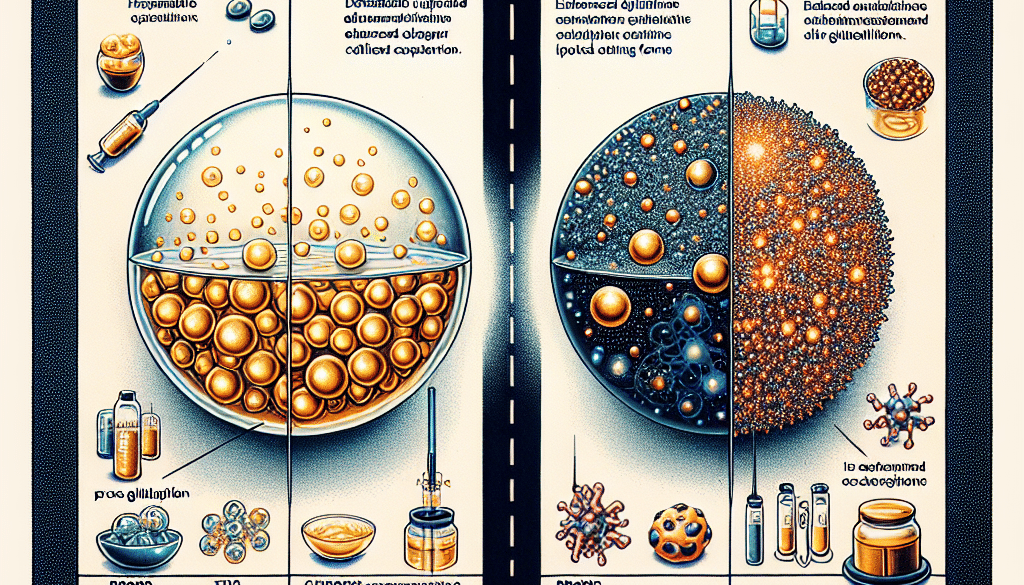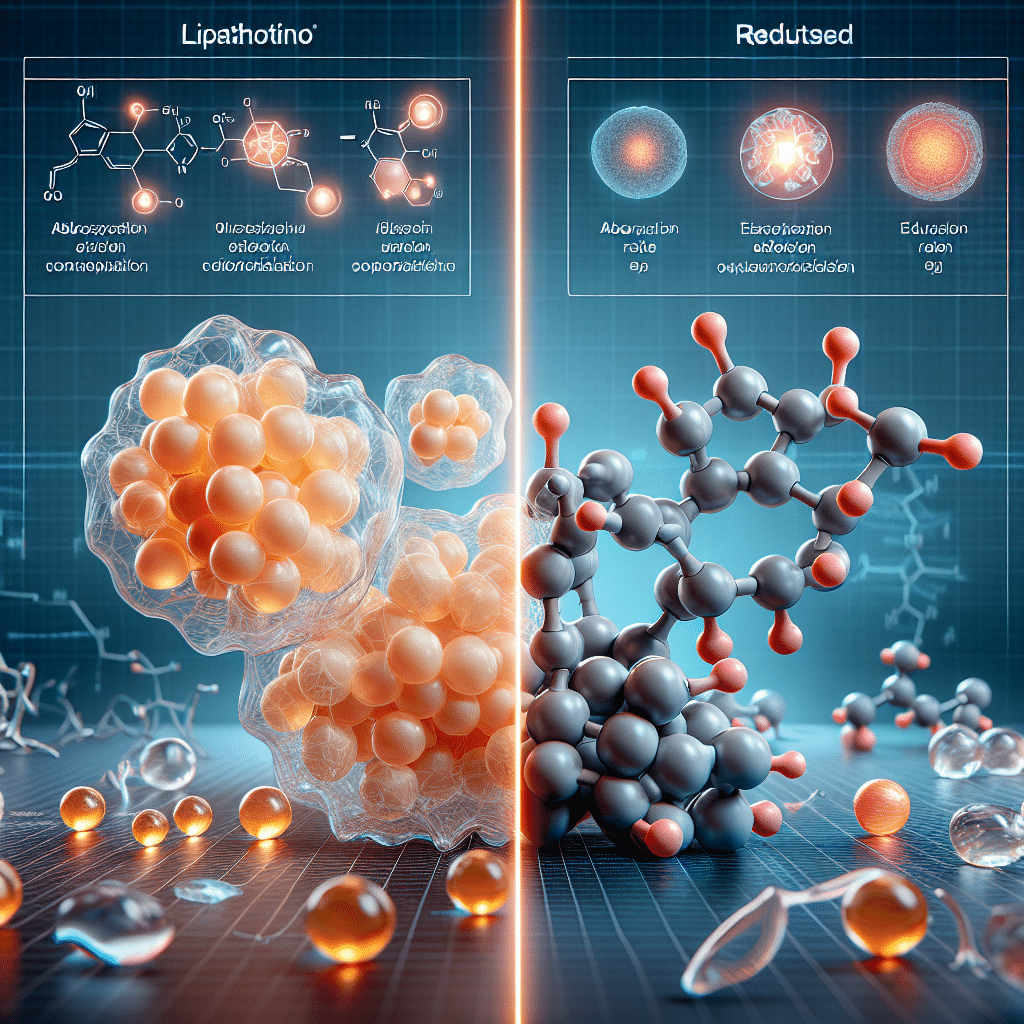Glutathione Liposomal vs Reduced: Comparison
-
Table of Contents
- Glutathione Liposomal vs. Reduced: In-Depth Comparison
- Understanding Glutathione
- What is Reduced Glutathione?
- What is Liposomal Glutathione?
- Comparing Absorption and Bioavailability
- Effectiveness in the Body
- Clinical Studies and Research
- Choosing Between Liposomal and Reduced Glutathione
- Conclusion: Key Takeaways
- ETchem’s Protein Products Recommendation
Glutathione Liposomal vs. Reduced: In-Depth Comparison
Glutathione, often referred to as the “master antioxidant,” plays a crucial role in maintaining oxidative balance and overall health. Its importance in the human body cannot be overstated, as it is involved in detoxification, immune function, and the neutralization of free radicals. With the rise of dietary supplements, two forms of glutathione have become particularly popular: liposomal glutathione and reduced glutathione. This article will delve into the differences between these two forms, their benefits, and how they work within the body.
Understanding Glutathione
Before comparing the two forms of glutathione, it’s essential to understand what glutathione is and why it’s vital for our health. Glutathione is a tripeptide composed of three amino acids: cysteine, glutamate, and glycine. It is found in every cell of the body and is essential for cellular metabolism and the body’s defense system against oxidative stress and toxins.
What is Reduced Glutathione?
Reduced glutathione, also known as L-glutathione or GSH, is the active form of glutathione within the body. It is capable of donating electrons to stabilize free radicals, thereby reducing oxidative stress. Reduced glutathione is the form that is naturally produced by the body and is also available in supplement form.
What is Liposomal Glutathione?
Liposomal glutathione is a form of glutathione that is encapsulated within liposomes. Liposomes are tiny, spherical vesicles made up of a phospholipid bilayer, which can encapsulate nutrients and protect them from degradation in the digestive system. This encapsulation is believed to enhance the absorption and bioavailability of glutathione when taken as a dietary supplement.
Comparing Absorption and Bioavailability
- Absorption: One of the main differences between liposomal glutathione and reduced glutathione is how they are absorbed by the body. Liposomal glutathione’s unique structure allows it to bypass the harsh environment of the stomach, leading to potentially higher absorption rates.
- Bioavailability: Reduced glutathione, when taken orally, may not be as bioavailable due to breakdown in the stomach and intestines. Liposomal glutathione, on the other hand, is designed to protect the glutathione molecule until it reaches the cells where it is needed.
Effectiveness in the Body
Both forms of glutathione have been shown to have beneficial effects on the body, but their effectiveness can vary based on individual health status and the body’s ability to utilize them. Liposomal glutathione may offer an advantage for individuals who have digestive issues or for those whose bodies do not naturally produce adequate levels of glutathione.
Clinical Studies and Research
Several clinical studies have been conducted to compare the effectiveness of liposomal glutathione to reduced glutathione. While research is ongoing, some studies suggest that liposomal glutathione may have superior absorption and efficacy, particularly in individuals with compromised health.
Choosing Between Liposomal and Reduced Glutathione
When deciding between liposomal and reduced glutathione, consider factors such as your digestive health, any existing health conditions, and your goals for supplementation. Consulting with a healthcare professional can also provide guidance tailored to your individual needs.
Conclusion: Key Takeaways
In conclusion, both liposomal and reduced glutathione offer benefits as dietary supplements. Liposomal glutathione may provide enhanced absorption and bioavailability, making it a potentially more effective option for some individuals. Reduced glutathione remains a valuable form of supplementation, particularly for those who may not require the enhanced delivery system of liposomes. Ultimately, the choice between the two will depend on personal health considerations and the advice of a healthcare provider.
ETchem’s Protein Products Recommendation
For those interested in optimizing their health and supplementing with high-quality protein products, ETchem offers a range of superior collagen products. Their extensive selection includes marine, fish, bovine, chicken, and various types of collagen, catering to a wide array of industries and individual needs. ETchem’s commitment to quality and customer satisfaction makes them a top choice for anyone looking to enhance their dietary regimen with premium protein supplements.
About ETChem:
ETChem, a reputable Chinese Collagen factory manufacturer and supplier, is renowned for producing, stocking, exporting, and delivering the highest quality collagens. They include marine collagen, fish collagen, bovine collagen, chicken collagen, type I collagen, type II collagen and type III collagen etc. Their offerings, characterized by a neutral taste, instant solubility attributes, cater to a diverse range of industries. They serve nutraceutical, pharmaceutical, cosmeceutical, veterinary, as well as food and beverage finished product distributors, traders, and manufacturers across Europe, USA, Canada, Australia, Thailand, Japan, Korea, Brazil, and Chile, among others.
ETChem specialization includes exporting and delivering tailor-made collagen powder and finished collagen nutritional supplements. Their extensive product range covers sectors like Food and Beverage, Sports Nutrition, Weight Management, Dietary Supplements, Health and Wellness Products, ensuring comprehensive solutions to meet all your protein needs.
As a trusted company by leading global food and beverage brands and Fortune 500 companies, ETChem reinforces China’s reputation in the global arena. For more information or to sample their products, please contact them and email karen(at)et-chem.com today.





